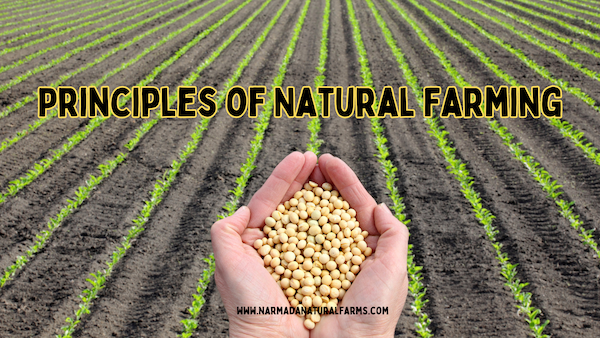Natural farming is a farming approach that puts harmony with nature at its core. It emphasizes working in sync with natural processes rather than against them. This approach, popularized by Japanese farmer Masanobu Fukuoka, offers a set of key principles that guide farmers to cultivate their land and manage their crops. Here are the fundamental principles of this mode of farming:
Also Read: My Journey From A Banker To An Agripreneur
1. No-Tillage Farming
No-tillage farming is a cornerstone of natural farming. It means not disturbing the soil through practices like ploughing or digging. By avoiding these activities, natural farming keeps the soil’s structure intact and maintains its natural balance. This results in less erosion, better water retention, and improved soil health.
When you don’t till the soil, you allow the natural organisms within it to thrive. These organisms, like earthworms and beneficial microorganisms, play a crucial role in keeping the soil healthy. They help break down organic matter, enrich the soil with nutrients, and improve its structure.
Also Read: Regenerative Agriculture and Natural Farming in India
2. Seed Saving and Indigenous Crops
Another key principle of natural farming is seed saving. Rather than relying on external sources for seeds, natural farmers save seeds from their own crops. This practice encourages the growth of crops that are well-suited to the local environment and conditions. Indigenous crop varieties, in particular, are preferred, as they have adapted over time to thrive in the specific climate and soil of the region.
Saving seeds also promotes biodiversity. It allows a wide range of crop varieties to coexist, each with its unique set of traits and qualities. This diversity can be beneficial in the long run, as different crops respond differently to environmental changes, helping to ensure a more stable and resilient agricultural system.
Also Read: How Does Hiring A Natural Farming Consultant Help Your Farm?
3. Non-Selective Weeding
In natural farming, weeding is not about removing all weeds indiscriminately. Instead, it’s a more selective process. Natural farmers choose to allow some weeds to grow alongside their crops. This approach is grounded in the belief that not all weeds are harmful. Some can actually be beneficial.
Beneficial weeds can provide protection to crops by creating microclimates and habitats for beneficial insects. They can also help reduce soil erosion. By selectively weeding, natural farmers maintain a balance between crop growth and weed management.
Also Read: Earthworms in Natural Farming
4. Minimal External Inputs
Conventional farming often relies heavily on external inputs like synthetic fertilizers and pesticides. Natural farming, on the other hand, focuses on minimizing these inputs. Instead, it emphasizes using on-farm resources, like compost, organic matter, and natural processes, to improve soil fertility and manage pests and diseases.
By reducing the reliance on external inputs, natural farming not only helps reduce production costs but also lessens the environmental impact of agriculture. Fewer chemicals mean less pollution and healthier ecosystems.
Also Read: The What, Why, and How of Soil Health at Your Farm
5. Crop Rotation and Polyculture
Crop rotation and polyculture are practices that enhance biodiversity in agriculture. It involves changing the crops planted in a particular field from season to season, which helps reduce the buildup of pests and diseases associated with one specific crop. Polyculture means growing different types of crops together in the same field. This can create a more resilient and balanced ecosystem, as different plants can support each other in various ways.
By practising crop rotation and polyculture, natural farming ensures that the land remains productive without the need for excessive chemical interventions. It mimics nature’s way of managing pests and diseases and reduces the pressure on a single crop species.
Also Read: How To Increase Organic Carbon At Your Farm?
In conclusion, the principles of natural farming are grounded in the wisdom of working with nature, rather than against it. By minimizing human intervention, preserving biodiversity, and emphasizing the health of the soil, natural farming offers a sustainable and environmentally friendly approach to agriculture. These principles can lead to healthier, more resilient ecosystems, while also reducing the reliance on external inputs and promoting self-sufficiency for farmers.
***
Please send a WhatsApp message to 9303539939 or an email to narmadanaturalfarms@gmail.com for more details on consultancy, webinars, or to purchase produce/seeds.
Follow us on Youtube at Natural Farming Made Easy.
